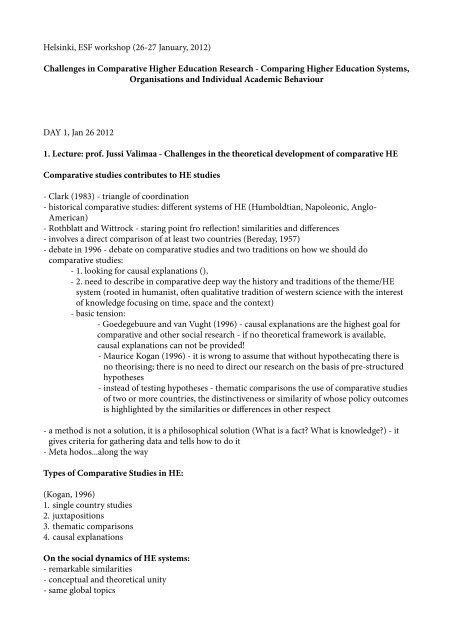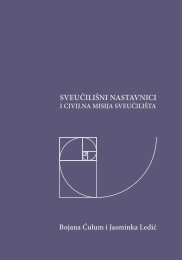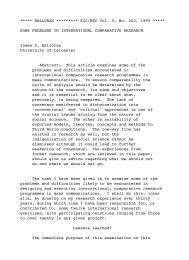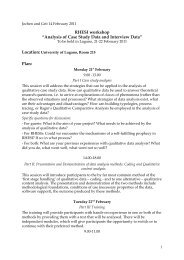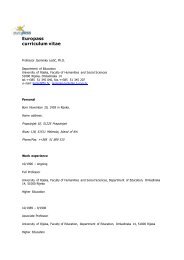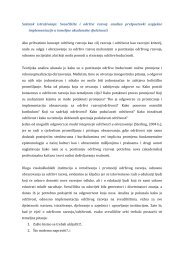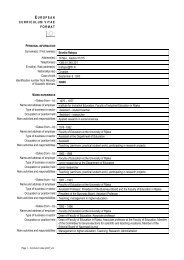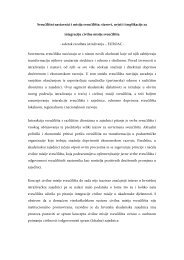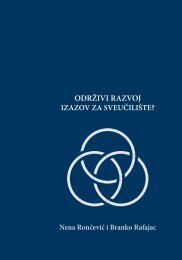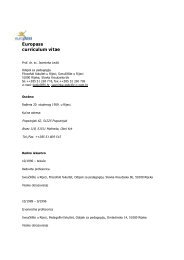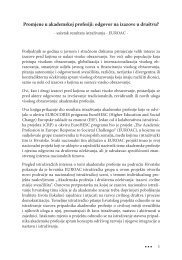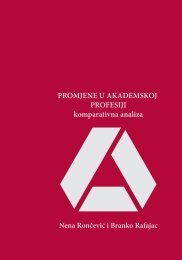Notes - euroac
Notes - euroac
Notes - euroac
You also want an ePaper? Increase the reach of your titles
YUMPU automatically turns print PDFs into web optimized ePapers that Google loves.
Helsinki, ESF workshop (26-27 January, 2012)<br />
Challenges in Comparative Higher Education Research - Comparing Higher Education Systems,<br />
Organisations and Individual Academic Behaviour<br />
DAY 1, Jan 26 2012<br />
1. Lecture: prof. Jussi Valimaa - Challenges in the theoretical development of comparative HE<br />
Comparative studies contributes to HE studies<br />
- Clark (1983) - triangle of coordination<br />
- historical comparative studies: different systems of HE (Humboldtian, Napoleonic, Anglo-<br />
American)<br />
- Rothblatt and Wittrock - staring point fro reflection! similarities and differences<br />
- involves a direct comparison of at least two countries (Bereday, 1957)<br />
- debate in 1996 - debate on comparative studies and two traditions on how we should do<br />
comparative studies:<br />
- 1. looking for causal explanations (),<br />
- 2. need to describe in comparative deep way the history and traditions of the theme/HE<br />
system (rooted in humanist, oen qualitative tradition of western science with the interest<br />
of knowledge focusing on time, space and the context)<br />
- basic tension:<br />
- Goedegebuure and van Vught (1996) - causal explanations are the highest goal for<br />
comparative and other social research - if no theoretical framework is available,<br />
causal explanations can not be provided!<br />
- Maurice Kogan (1996) - it is wrong to assume that without hypothecating there is<br />
no theorising; there is no need to direct our research on the basis of pre-structured<br />
hypotheses<br />
- instead of testing hypotheses - thematic comparisons the use of comparative studies<br />
of two or more countries, the distinctiveness or similarity of whose policy outcomes<br />
is highlighted by the similarities or differences in other respect<br />
- a method is not a solution, it is a philosophical solution (What is a fact? What is knowledge?) - it<br />
gives criteria for gathering data and tells how to do it<br />
- Meta hodos...along the way<br />
Types of Comparative Studies in HE:<br />
(Kogan, 1996)<br />
1. single country studies<br />
2. juxtapositions<br />
3. thematic comparisons<br />
4. causal explanations<br />
On the social dynamics of HE systems:<br />
- remarkable similarities<br />
- conceptual and theoretical unity<br />
- same global topics
- different mission/goals, structures, external society<br />
- How does a HE system work?<br />
- What purpose does HE aim to serve?<br />
What influences the social dynamic of HE systems?<br />
1. size of the national HE system (and size of language area)<br />
2. structure of the state (federal/nation state)<br />
3. power relations of actors (finances, trade unions, student organisations / policy field)<br />
4. traditions (nation building/social structure/reproduction/colonial heritage - what is the purpose<br />
of HE?)<br />
5. geographical environment and climate (north/south; flat lands vs. mountains; weather/climate is a<br />
cultural and social category!)<br />
- historical models of HE are academic constructions<br />
Great Challenge: How to make a knowledge of what we see and feel?<br />
Preporuke za čitanje:<br />
1. Comparative Historical Analysis in the Social Sciences (Cambridge Studies in Comparative<br />
Politics) by James Mahoney and Dietrich Rueschemeyer (10 Feb 2003)<br />
2. Epistemic Cultures: How the Sciences Make Knowledge by Karin Knorr Knorr (4 Jun 1999)<br />
3. Jeff Jonson (Handbook of Qualitative Analysis) chapter-in depth analysis<br />
2nd Lecture: Ulrich Teichler<br />
- focus on conceptual and operative problems in comparative studies in HE<br />
- knowledge society - a nervous concept<br />
- horizontal mobility - learning from contrasts! you are getting exposed to knowledge about<br />
something else, something different - you can not return to primitive, normal way of living aer<br />
that - that knowledge stays forever<br />
- simple practical comparative activity has an effect of permanent destruction<br />
- one’s intellectual village is not a universe!<br />
- start learning from the contrast and exposition to different experiences - doesn’t mean you<br />
understand the differences, but you simple can not get back aer being exposed to differences and<br />
variations different from your intellectual village<br />
- market / state / academic oligarchy (Burton Clark and three concepts/3 power lines)<br />
- Martin Trow - PROČITATI/web check (era of elite education/mass education/universal education)<br />
- HE research usually have wrong references upon his work!<br />
- understanding functional equivalence<br />
- researchers are usually missionaries of their own experiences, from their own countries making<br />
their intellectual village the universal one, proposing their own national models ad universal<br />
- “home country ignorant missionary” - tries to avoid this concept in the projects he is running/<br />
participating in<br />
- to be challenged in previous convictions, and assumptions (better life if shaken in conviction,<br />
instead of going around and preaching only about your own convictions)<br />
- majority of scholars try to collect information by creating high likelihood for approving their own<br />
convictions!
- if you go into the comparative research you must like to improve your knowledge by surprises, by<br />
being shaken, by acknowledging differences, by believe in variety of ways, thoughts - be happy to<br />
learn something new:)<br />
- from his point of view comparative study is already when you collect the available knowledge,<br />
published something in your own language, for the audience from your country appointing them<br />
the differences on various element considering national HE system<br />
- comparative studies dramatically extend the knowledge on the subject<br />
- world of comparative projects is full of drama:)<br />
- great start for comparative research: people addictive for opening the eyes for diversity; challenge:<br />
competitive elements, misunderstanding, miss-colaboration, communication in an environment<br />
full of traps:)<br />
- you research and explore phenomena in areas you were ignorant before -that is the challenge of<br />
science and scientists/HE research<br />
- what kind of knowledge would be the more salient one for explaining/understanding the<br />
phenomena - you need some kind of simplicity for broader exploring, but minimum explaining<br />
e system level - important/crucial elements (Emanuela Reale)<br />
- research design<br />
- concept and theories<br />
- methodological problems (recognize limitations)<br />
- data issues<br />
- country specificity, filed/sector/discipline specificity<br />
- research and research team dynamics<br />
prof. Jussi Valimaa<br />
How does your system of education work?<br />
What purpose does HE aim to serve?<br />
what are the intentions of legislators?<br />
sources of legitimacy<br />
HE ideology?<br />
In relation to:<br />
1. the size of the national HE system<br />
2. the structure of the state<br />
3. power relations of the actors<br />
4. traditions<br />
5. geographical environment and climate<br />
Small groups:<br />
Gaelle presentation:<br />
- US (California) - Indonesia - France (student experience)<br />
- rational for country elections: contrast/different societies<br />
- link of students identity with admission (selection) process to the HE system<br />
- stimulating process<br />
- inductive approach<br />
- interviewing students
- exploring students’ experiences, what was important to them? their identities<br />
- “if you do not start with the field work, you just miss it all”<br />
- collecting data, giving meaning to the data<br />
- scientific implications vs. practical implications (for university leaders, or policy makers) vs. policy<br />
implications<br />
- providing new knowledge<br />
- link with HE research and policy field<br />
- transmission of knowledge to policy makers - very limited way of knowledge transmission<br />
- how HE can enrich the ‘ideal society’<br />
- not policy driven research in starting position<br />
- massification lead to a diversification, to different stakeholders looking up t university and<br />
expecting different inputs<br />
- theory of function of the modern university? - it has been addressed from the organisational<br />
perspective - they just give the answer on how should universities be organised? they do not<br />
discuss the importance of HE, the role of HEI in the society<br />
- university - institution or organisation?<br />
- functional perspective is needed - universities try to meet various stakeholders’ expectations<br />
- historical perspective - Parson (60s and 70s) (pročitati)<br />
- what differences are discovered under the same element of mission/construction?<br />
Filipa presentation:<br />
- knowledge studies<br />
- discourse analysis and social network analysis<br />
- how does knowledge merge toward emerging and absence knowledge?<br />
- curriculum analysis and policy - power relation - which knowledge is being taught?<br />
- how have universities contributed to knowledge transmission over time (to knowledge emergence<br />
and absence)<br />
- why is some knowledge more present in some universities and not in some others?<br />
- benchmarking and ‘best practices’ driven out of comparisons - usually misused<br />
- ‘knowledge based policy’ - what is behind? how HE researchers contribute to it?<br />
- how knowledge is translated into curricula?<br />
-<br />
Challenges:<br />
- criteria to choose universities?<br />
- criteria to choose actors?<br />
- rationals?<br />
- social function as a criteria?<br />
Ivar Bleiklie - Comparing organisations<br />
What implications do conceptualizations in projects have on your research projects?<br />
Open questions:<br />
- What is the rationale for comparative research in HE? / what are the rationales...?<br />
- Are we only doing it because money is available?<br />
- Lost between a lack of information and extreme complexity? - surviving strategies in the final stage<br />
of projects<br />
- How to take history into account to understand path dependencies?
DAY 2 - Jan 27, 2012<br />
prof. Ulrich Teichler<br />
e Daily Life of Comparative Higher Education Research: Experiences from Six Surveys on the<br />
Academic Profession and UNiversity Graduates<br />
5 main points...<br />
1. e world is more complex - we need more complex mindset<br />
2. Richness of information which can be really overwhelming<br />
3. You need a (survival) strategy to deal with the overload of information (to survive the complexity<br />
of research)<br />
4. All the problems which we have in research are magnified in collaborative international research<br />
(international comparative research is full of drama:)<br />
5. In comparative research you are full of value judgment<br />
- intentionally accepted limitations on scope, methods, resources...<br />
- heterogeneity of researchers’ motivation, interest, expertise, experiences, lifestyles...you can not<br />
overcome this heterogeneity<br />
- comparative enlightenment<br />
- making friends (and family:)<br />
- creating necessity for collaborative activities between members, as well as creating enough pen<br />
space for researchers to focus on their areas of interest<br />
- international comparative research is more a mindset than a group of methods<br />
eoretical perspective prior entering international collaborative project: What do we know about<br />
the XY subject before we enter this crazy dramatical experience? :) Later on make a connection -<br />
Are we on the same level of knowledge? - this is what is important!!!<br />
Working groups:<br />
- what is the main issue of logic of the comparison?<br />
- highlights on the logic of comparison<br />
sarah:<br />
- Science Europe - nova organizacija, počeli raditi na uspostavljanju, vjerovatno će zadržati 20ak<br />
ljudi is ESFa, za sada je jedno 7/0ak ljudi dobilo otkaz, ocekuje se do kraja godine da ce otpustiti jos<br />
30 ljudi<br />
- ideja je nove organizacije raditi forward look...što bi se trebalo istražovati i financirati? a<br />
nacionalne agencije i fondacije bi trebale imati dominantnu ulogu u financiranju


